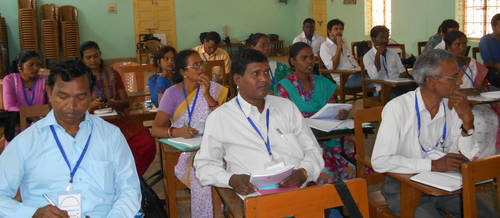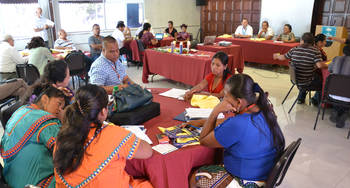Lack of recognition of indigenous peoples' customary access to their lands, in particular to communal lands, natural resources and territories is a widespread problem indigenous peoples around the world face. Whether communities live off rivers, forest or pastures, they see, on a daily basis how their access is hampered, sometimes through the use of violence and forced displacement.
India

In partnership with the Asia Indigenous Peoples Pact (AIPP), Indigenous Peoples team and the Land Tenure team in FAO have built a one-year capacity-development programme specifically built around the most common challenges faced by Indigenous Peoples. Its aim is to explore how they can use the Voluntary Guidelines on the Responsible Governance of Tenure of Land, Fisheries and Forests in support of their land tenure rights.
The first two subnational workshops took place in November 2015 in Assam and Odisha respectively for North East and Central India, bringing together 25 participants from each region during three days (click here to see pictures). In august 2016, a national training was implemented in New Delhi. This experience will be replicated in Indonesia, where one national and two subnational trainings will be carried out.
Central America

In the same line, FAO is also parterning with the Centro para la Autonomía y Desarrollo de los Pueblos Indígenas (CADPI) to implement this capacity development programme in Central America. Starting on Sunday 14th of Februrary 2016, the training gathered in Ciudad de Panama a total of 25 indigenous peoples' representatives and experts from Costa Rica, Guatemala, El Salvador, Panama, Nicaragua and Honduras to learn and discuss on the practical uses of the Voluntary Guidelines. In addition, as a part of its agreement with FAO, CADPI will translate the Guidelines into the indigenous languages Miskitu and Q'eqchi, so they can be more widely distributed and used in future trainings.
Key facts about indigenous peoples and tenure
- Indigenous peoples have an intimate connection with their traditional lands, territories and resources, which shapes their lives, cultures and spirituality.
- Their livelihoods are closely based on the sustainable management of their natural resources, while their traditional practices have resulted in biodiversity conservation in those territories they inhabit.
- Indigenous peoples tenure rights are understood within their collective rights. Their customary rights often refer to the management of communal areas and resources.
- The lack of recognition by states and the private sector over their traditional lands, territories and resources is a source of conflict and places them in a situation of vulnerability.

